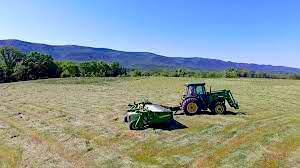
~ Press release issued by Virginia Farm Bureau Federation
FAYETTEVILLE, Ark. — In rural Virginia, farming and hunting often go hand in hand.
Agricultural land that offers food, water and shelter for wildlife is considered prime real estate for hunting. Farmers and other rural landowners routinely grant hunters access to portions of their land through lease agreements.
Creating hunting lease agreements that work for every involved party can be challenging, but a recent informational webinar provided advice to landowners.
“Hunting Leases and Liability: What Should the Landowner and Hunter Look For in a Lease?” was hosted June 15 by the National Agricultural Law Center at the University of Arkansas. A full recording of the webinar can be accessed online.
Rusty Rumley, a senior staff attorney for the National Agricultural Law Center, urged participants to consider aspects of a lease beyond the basics, such as setting a duration and payment terms.
Other important issues, such as establishing who is permitted to hunt with the lease, determining the need for liability insurance and limiting land use to predetermined activities, also should be considered, Rumley noted.
Additional topics, including specifying boundaries, use of fixed assets on leased property, subleasing and termination of a lease, also were discussed.
“You really need to make sure you know exactly what everything in your lease agreement (entails),” Rumley said. “It’s a very good idea to make sure you’ve thought about some of the potential issues and address them in the very beginning.”
He suggested landowners meet with lawyers based in the same state as the leased land to create a clear agreement.
“Just like with agricultural leases, it makes sense to have a written hunting lease when allowing individuals to utilize your land,” said Stefanie Taillon, Virginia Farm Bureau Federation senior assistant director of governmental relations.
“Hunters can be helpful to farmers by assisting with wildlife damage control and serving as an extra pair of eyes on their property,” she added. “It’s important to maintain strong, positive relationships, and establishing expectations up front can go a long way toward reducing conflict before it starts.”
•••
RELATED ARTICLES
Virginia farmers diversify and expand with value-added agriculture
Virginia sweet corn flourishing despite blistering heat
Spotted Lanternfly quarantine zone expanding to more Virginia localities, including Page County
Virginia Tech researchers working to develop methods to measure farm-to-fork food loss
Virginia farm exports reached all-time high in 2021
Future of farming in Page, a work in progress
Extension Office seeks vendors for weekly farmers market at PMH June through October



Be the first to comment